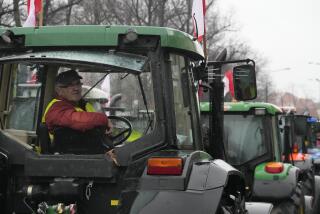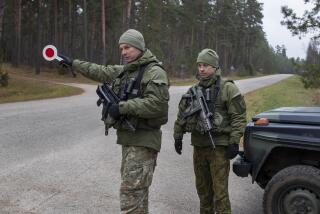Lithuania Sees Negotiations, No Blockade
- Share via
VILNIUS, Soviet Union — Lithuania’s president said Tuesday that measures announced by Moscow to reassert control over the breakaway Baltic state show that negotiations with the Kremlin are still possible and that there is no danger of an economic blockade.
Despite such conciliatory words, Vytautas Landsbergis revealed that he has stepped up security at the republic’s lone nuclear power plant to prevent any acts by “madmen.” And a subordinate said economists are compiling plans for stockpiling strategic goods to parry the consequences of any eventual trade war waged by Moscow.
Meanwhile, hundreds of Lithuanian youths volunteered to serve as the breakaway republic’s customs and frontier guards despite a Kremlin warning not to change border security operations, wire services reported. But republic officials said there are no plans to arm the largely symbolic border force.
Nine days after declaring their Ireland-sized homeland independent once again, Lithuanian leaders are still insisting they have a legal right to do so but also stressing that even independent, Lithuania would continue to honor existing commitments to the Soviet Union.
“We want the economy, and specific enterprises in particular, to continue functioning in a normal manner, and we are completely against cutting off economic ties,” Landsbergis told the republic’s legislature. He expressed hope that contracts for both raw materials and finished goods will still be respected.
Lithuania would likely be the big loser in any disruption of trade, since it is poor in natural resources and depends on the Soviet hinterland for supplies of oil and natural gas. Statistics issued by the central government indicate that it imports $2.5 billion more in products than it sends the country’s 14 other constituent republics, although Lithuanians charge the state pricing system is skewed to depress the value of the goods they manufacture.
Rumors of looming Soviet military action to re-establish Kremlin rule continued to sweep through Lithuania’s population of 3.7 million, but a Western reporter who drove more than 200 miles from the southern border with Byelorussia to the northern frontier with Latvia on Tuesday saw no sign of military or large-scale police activity.
Soviet leaders have promised not to use force, a pledge repeated Tuesday by Foreign Minister Eduard A. Shevardnadze in Windhoek, Namibia, where he is attending independence ceremonies.
Meanwhile, President Mikhail S. Gorbachev continued his personal campaign to prevent the Lithuanian example from spreading to the other Baltic republics. He met Tuesday in Moscow with the three top government and party leaders from Latvia, one day after reportedly telling high-ranking Estonian officials that “the road chosen by Lithuania leads to a dead end.”
The official Estonian daily Paevaleht, which reported on Gorbachev’s four-hour meeting with the Estonians, said he insisted that 50 years of Soviet rule in the Baltic republics have given Moscow legitimate rights there, although the formerly independent states were forcibly annexed by the Kremlin in 1940.
“Gorbachev pointed out that in the event of a divorce, it is not important whether the marriage was contracted legally or not. The property must be divided nonetheless,” Paevaleht reported. Interfax, the news service of Radio Moscow, said the Estonian officials replied that most of their people favor a restoration of their homeland’s sovereignty.
Both Estonia and Latvia held elections last weekend, and incomplete returns indicate the balloting is likely to send large numbers of independence advocates, and perhaps majorities, to their legislatures, where they could follow the example set by the Lithuanians and formally proclaim independence.
On Monday, Soviet Prime Minister Nikolai I. Ryzhkov instructed central government ministries, including the KGB, to act immediately to stop Lithuania from moving to disengage its economy from that of the Soviet Union as a whole.
“We feel the Ryzhkov statement is, in a certain sense, a guarantee that there will be no economic blockade because (it shows) the Soviet Union is interested in maintaining economic ties with Lithuania,” Landsbergis commented. He later told a news conference that Ryzhkov’s remarks signal “a new stage in Soviet-Lithuanian relations” and a starting point for negotiations to work out the details of secession.
Ryzhkov specifically ordered his ministers to assume direct management immediately of all centrally owned or operated enterprises in Lithuania and to enforce “radically increased” security at the atomic power station northeast of the capital of Vilnius.
In Parliament, Landsbergis said that “already yesterday we received information from the Ignalina nuclear power plant that new and unfamiliar people had shown up there. Today, the (Lithuanian Interior Ministry) . . . confirmed that additional security was sent from that agency, which at the present time is managing the plant.”
He told reporters later that the main danger from the plant comes from “its own outdated Soviet construction” but added, “Security against madmen is not a bad thing.” He did not elaborate.
If there was increased security, it was not readily apparent Tuesday at Ignalina, whose two cooling towers rise from a flat landscape forested with firs.
“There are no soldiers here, no more than we usually have,” said Antanina Kovaleva, 45, who lives in the nearby town of Snieckus, built to house plant workers and their families.
Despite Ryzhkov’s toughly worded order, Antanas A. Mercaitis, deputy chief of the Lithuanian State Planning Commission, said local officials have the means to guarantee that factory directors heed the will of newly independent Lithuania and not Moscow bureaucrats.
“We can hold up the shipment of their finished products; we can use financial levers,” he said.
Asked if there are plans to stockpile vital commodities such as fuel and raw materials, he replied: “We have been working on such plans, but we have not yet started such stockpiling. We have different scenarios, but that’s all I can say at the moment.”
The independence declaration deeply polarized public opinion in Lithuania, where there are large minority communities, including Russians and Poles. Leaders of a rump Communist Party faction still loyal to Moscow called Tuesday on Gorbachev to impose direct presidential rule on Vilnius and the region surrounding the capital, where many residents are non-Lithuanians.
Schrader, a free-lance journalist, reported from Vilnius, and Times staff writer Dahlburg from Moscow.
More to Read
Sign up for Essential California
The most important California stories and recommendations in your inbox every morning.
You may occasionally receive promotional content from the Los Angeles Times.













